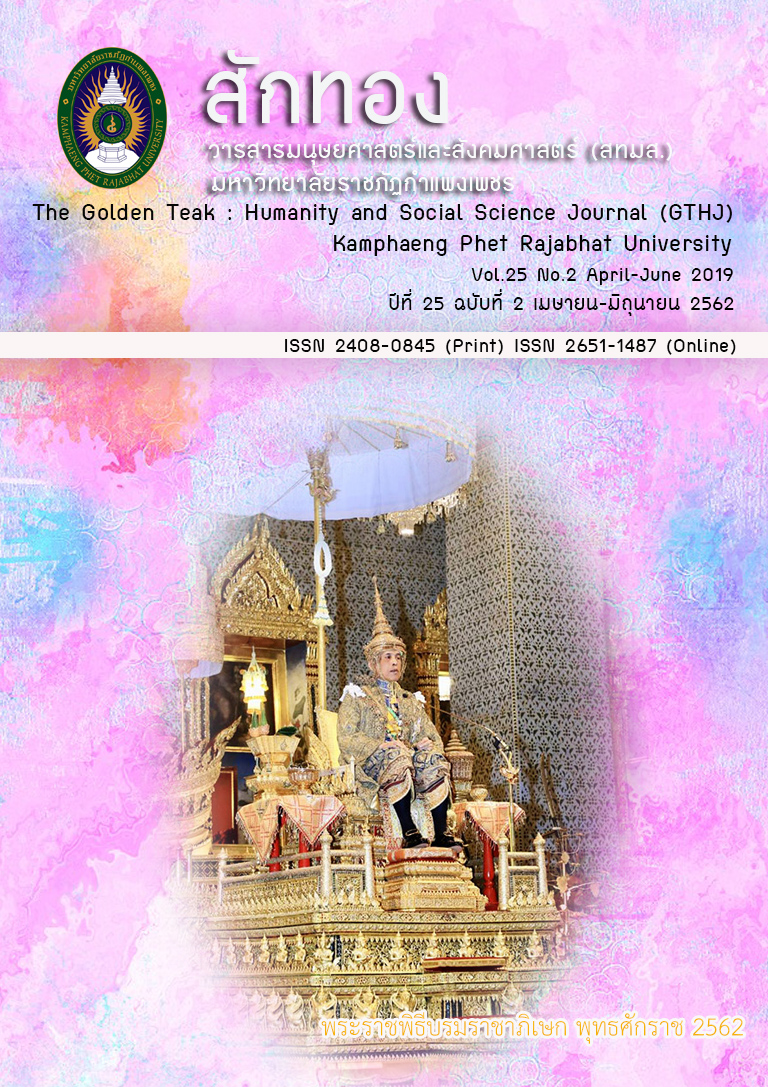Service Development Model for Security Business in Thailand
Main Article Content
Abstract
This article is a part of the dissertation ‘The Service Development Model of Thailand Security Business’. The objectives of the study are 1. to study the factors that affect the services provided in the security business management; 2. to study the influence that affect the employees’ efficiency in the development of the security service business; 3. to develop The Service Development Model of Security Business to ensure that customers will receive good service quality. The research methodology is Mixed Methods - a combination of Qualitative and Quantitative Research. The population was 3,717 security companies. After 4 months of data collection, then configure each variables, datas were analyzed by computer program, which used Statistic, Percentage, Standard Deviation and Pearson’s Product-Moment Correlation Coefficient. Then the data were analyzed by AMOS program, using Structural Equation Modeling (SEM) techniques to confirm conclusion its conceptual framework. The results of the study revealed that (1) Management Leadership (2) Career Paths (3) Compensation & Rewarding Motivation (4) Employee Engagement and (5) Employee Performance are the five key succession factors for develop the Service Development Model of Thailand Security Business.
Article Details
บทความที่ได้รับการตีพิมพ์เป็นลิขสิทธิ์ของวารสาร สักทอง : วารสารมนุษยศาสตร์และสังคมศาสตร์ สถาบันวิจัยและพัฒนา มหาวิทยาลับราชภัฏกำแพงเพชร
ข้อคิดเห็นใดๆ ที่ปรากฎในวารสารเป็นวรรณกรรมของผู้เขียนโดยเฉพาะ ซึ่งมหาวิทยาลัยราชภัฏกำแพงเพชรและบรรณาธิการไม่จำเป็นต้องเห็นด้วย
References
Corporate Leadership Council, 17.
Chaiwattananon, R. (2015). Quick Response-Strategic (Un) Satisfaction Management.
[Online]. Available : http://www.entraining.net/in-house_rachan-satisfaction-
strategy.php [2015, April 29].
Hair, J., Anderson, R., Tatham, R. & Black, W. (1998) Multivariate data analysis. (5 th ed.).
Prentice Hall, New Jersey.
Jongwannasiri, S. & U-On, V. (2016). Factors of Influencing Investors' Investment Intentions. International Humanities, Social Sciences and Arts, 9(3), 1094-1107.
KasikornThai Research Center. (2009). Security Service Business: Economic Business Growth. Business Brief (Vol. 1885): K Bank.
Kotler, P. & Keller, K.L. (2009), Marketing Management. New Jersey : Prentice Hall.
Murtonen, M., Jähi, M., & Rajala, A. (2012). More value from security. VTT Science, 25, 172.
Prasitrathasin, S. (2011). New Qualitative Research Methodology. Bangkok : Thammasat Printing.
Schumacker & Lomax. (1996). A Beginner's Guide to Structural Equation Modeling.
(3 rd ed.). London : Routledge.
Strom, K., et al. (2010). The Private Security Industry : A Review of the Definitions, Available Data Sources, and Paths Moving Forward. RTI International, 4-8.
Thananan, S. (2009). Human Resource Development. Bangkok : TPN press.
Thailand Management Association. (1989). Personnel Management Terminology. Bangkok : TMA. Printing.
The Department of Business Development. (2015). Service Business. [Online]. Available :
http://www.dbd.go.th/ewt_news.php?nid=5203&filename=index. [2015, April 29].
U-On, V. (2010). Business Information Research. Bangkok : Sripatum Printing.
_______. (2011). The marketing mix model for decision-making in higher education Bachelor's degree in private institutions. Burapha University Journal of Commerce, 3(1), 34-43.


